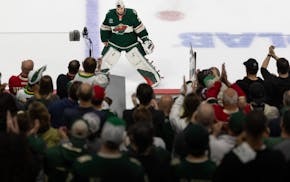The Timberwolves traded Karl-Anthony Towns in part because they craved flexibility.
Which they need.
Because to justify the trade today, you'd have to bend over backward.
As the Wolves prepare to play Towns and the Knicks in New York on Friday, they are coming off one of their most ill-timed and embarrassing losses of the season.
They didn't show up for the first quarter in a game that was important not because of the quality of the opponent, but because of the difficulty of the upcoming schedule.
The Wolves needed to beat Golden State on Wednesday to avoid the possibility of sinking in the Western Conference standings. They could play fairly well and still lose four or six of their next seven games.
Instead, they looked apathetic until it was too late.
I maintain my belief that this team could learn how to play together in time to secure a reasonable seeding and win a playoff series or two. But that belief is being tested, just as Towns looms, again, on the schedule.
The last time these teams met on Dec. 19, Towns toyed with the Wolves at Target Center. He produced 32 points, 20 rebounds, six assists and two steals in 38 minutes of the Knicks' 133-107 blowout victory.
With Towns, the Knicks have a winning percentage of .643. Last year, their winning percentage was .610.
Last year, with Towns, the Wolves' winning percentage was .683. Currently, it is .525.
The Wolves traded Towns to the Knicks for Julius Randle, Donte DiVincenzo, a first-round draft pick and Keita Bates-Diop.
To date, the Wolves have lost the trade. They gave up the best player in the deal, that player has performed like a star, and the Wolves have struggled to adapt to Randle's playing style, while missing Towns' scoring, three-point shooting, rebounding and even defense.
Maybe financial realities and long-term planning forced the Wolves to trade Towns, but at the moment it seems the Wolves' brain trust made the same mistake that the fan base had made repeatedly over the years:
Not appreciating Towns' value as a player and a personality.
Towns drove you crazy by complaining about foul calls? How about Anthony Edwards consistently failing to get back on defense while behaving the same way?
Towns altered his playing style and accepted a different position to accommodate Edwards' rising star and Rudy Gobert's arrival. Now we're seeing Edwards and Randle struggle to coexist, not because they lack good intentions, but because both need the ball, and there is only one.
There are those inside the organization who rolled their eyes at Towns' good-guy, happy-go-lucky persona, but Towns walked the walk, in the way he treated teammates and the public, and with his many good works.
The Timberwolves' brain trust overrated Randle and their ability to incorporate him into a team that had finally coalesced late last season and in the playoffs. Meanwhile, Towns is thriving in a basketball mecca for a superior team.
This story is a long way from reaching its final chapter. Even a realist can see this trade working out for the Wolves in the long run, and the Wolves were always unlikely to keep Towns for his entire career.
Even with all of those excuses in place, the realities are these:
The Wolves were coming off their best playoff run in franchise history, given that they swept a quality Suns team, then won a Game 7 on the home court of the defending champions.
They waited until the beginning of training camp to make a deal, meaning that training camp and the early schedule would be dedicated to incorporating two new rotation players instead of honing what made the previous year's team exceptional.
They acquired Randle, who is at his best when he has the ball, to pair with Edwards, who needs the ball to justify his salary and status.
They will likely lose Randle, who has a player option on his contract, this summer, which will free up some money but make this trade look even worse in terms of talent lost and gained.
We don't have to judge this trade today. But if we did, the judgment would be harsh.
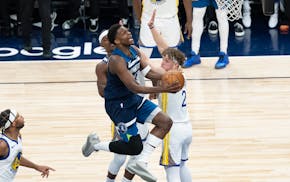
Souhan: Pondering Ant, whose injuries are no worry but whose shooting is a large concern
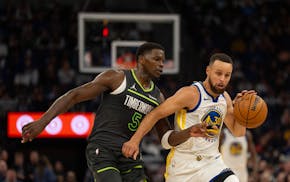
Souhan: Story lines aplenty when Wolves, Warriors clash
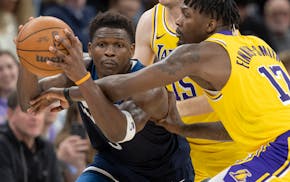
Souhan: Wolves thrive even when Ant struggles offensively
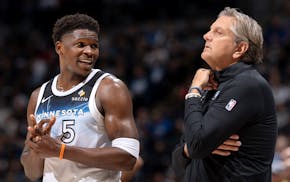
Souhan: 'In Finchy we trust' a true calling card for the Wolves
